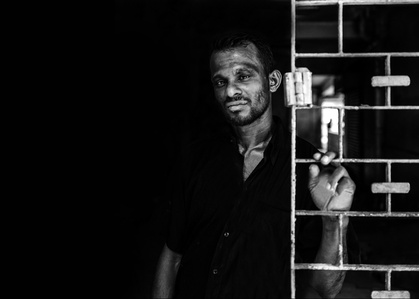
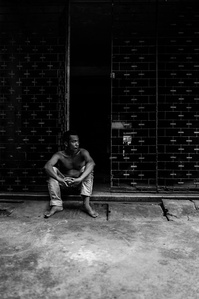

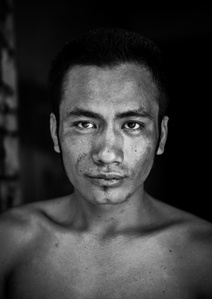

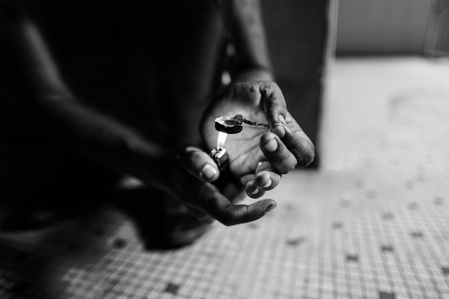

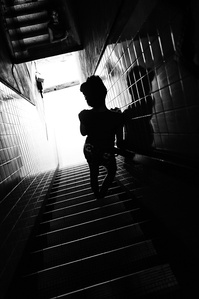
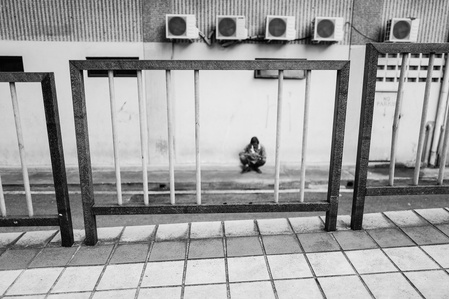
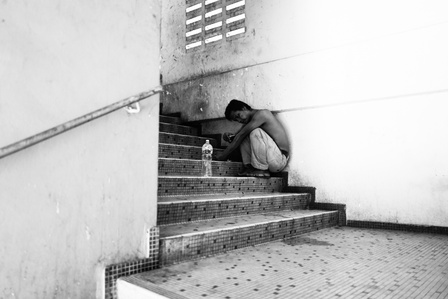



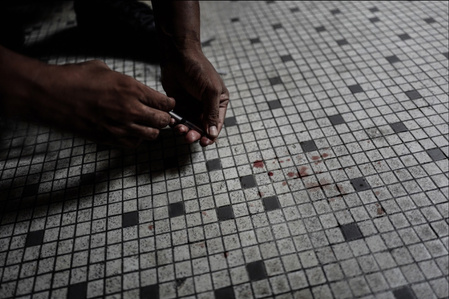
A VERY OLD HUNGER
Ye and Win sit and wait for a break in the ceaseless, stultifying afternoon. Akash, the Bangladeshi boy, fear frothing over now, pokes and prods at you. Wispy Uncle Cho, his countenance grey and famished, scuttles off out of sight to beg for money for food, wiggling his stumped limb to bait passers by. His flimsy front though hides not a hunger of an even more formidable kind.
Heroin is back. And it's pink. And as intoxicating for the media as it is for the Burmese junkies lolling, itching, clucking and scampering around in varying stages of withdrawal.
This though is not a story of the rise of the new pink colour-dyed dope that's flooding Southeast Asia. Nor is it a story of migrants, refugees, race, poverty or crime. Nor in fact, is it a story of drugs of any sort, shape or colour. This is a story of addiction - a very old hunger.
For around 10% of the population addiction is a mental obsession entwined with a physical compulsion, a neurochemical aberration, a chronic and relapsing brain disease characterized by the pathological pursuit of reward and/or relief by substance use or process. And as such, this is an issue of public health, though it's rarely seen as such - largely as it's impossible for the addict to shed the reputation of being at best hedonistic or at worst a lazy, wretched, lying, thieving scumbag trawling through a mire of self-inflicted catastrophe. (Especially if caught in the cycle of poverty, and then the chances of finding recovery are very, very grim.)
The stark reality is that addiction is neither pleasureful or voluntary. With each substance or process hit there is a powerful surge of the neurotransmitter dopamine into the pre-rational limbic brain, hijacking the brain's system of reward-related learning that creates the motivation for one to perform actions indispensable to survival. Over time, the brain becomes reliant on a substance or process trigger to produce dopamine and so it becomes increasingly harder for the neurotransmitter to be produced by more natural, neutral, everyday stimuli - like walking, talking, task-completing or smiling. The addict then becomes dependent on a hit to just feel comfortable; no hit and no dopamine and the addict spirals into desperation: often an on-off sequence of quitting and relapsing as you become tormented at the whim of your own dysfunctional neurochemistry. You make a rational cerebral cortex decision not to use and then in an overwhelming instant this is involuntarily overridden; every cell screams in unison for the hunger to be satiated. A force stronger than that of survival courses through you in waves, pushing you to a bitter end. Cease using and you'll feel like you're about to die; continue and you will. The choice, at least initially, is always only between a living death and a certain death.
ANOTHER PLATEAU
"Fear of self-sacrifice lurks deep in every ego, and this fear is often only the precariously controlled demand of the unconscious forces to burst out in full strength. No one who strives for selfhood (individuation) is spared this dangerous passage, for that which is feared also belongs to the wholeness of the self — the sub-human, or supra-human, world of psychic dominants from which the ego originally emancipated itself with enormous effort, and then only partially, for the sake of a more or less illusory freedom. This liberation is certainly a very necessary and very heroic undertaking, but it represents nothing final: it is merely the creation of a subject, who, in order to find fulfilment, has still to be confronted by an object. This, at first sight, would appear to be the world, which is swelled out with projections for that very purpose. Here we seek and find our difficulties, here we seek and find our enemy, here we seek and find what is dear and precious to us; and it is comforting to know that all evil and all good is to be found out there, in the visible object, where it can be conquered, punished, destroyed or enjoyed. But nature herself does not allow this paradisal state of innocence to continue for ever. There are, and always have been, those who cannot help but see that the world and its experiences are in the nature of a symbol, and that it really reflects something that lies hidden in the subject himself, in his own transubjective reality.”
— DR. C. G. JUNG, FROM THE INTRODUCTION TO THE TIBETAN BOOK OF THE DEAD
EXILE
"Every night, when he didn't want to be alone. of to age or die, with that set expression he assumed which she occasionally recognized on other men's faces. the only common expression of those mad men hiding under an appearance of wisdom until the madness seizes them and hurls them desperately toward a woman's body to bury in it, without desire. everything terrifying that solitude and night reveals to them.”
– Camus
// Portrait shoot in Lantau, Hong Kong
// Editorial shoot for LA fashion label Le Monde Gris.
UNLESS
“An aged man is but a paltry thing, A tattered coat upon a stick, unless
Soul clap its hands and sing, and louder sing
For every tatter in its mortal dress.”
— William Butler Yeats
WHAT WE DO AND WHAT HAPPENS TO US
// Commercial Shoot for Nike in Bangkok, Thailand
DO YOU DO IT OR DOES IT DO YOU?
Do you do it or does it do you?
INFINITE FACULTY
“What a piece of work is a man! How noble in reason! how infinite in faculty! in form, in moving, how express and admirable! in action how like an angel! in apprehension how like a god! the beauty of the world! the paragon of animals! And yet, to me, what is this quintessence of dust? man delights not me; no, nor woman neither, though, by your smiling, you seem to say so.”
– Hamlet (2.2.256-261)
// Portraits for Broadway show on tour in Seoul, Korea
A STATIONARY ORGANISM
“Junk turns the user into a plant. Plants do not feel pain since pain has no function in a stationary organism. Junk is a pain killer. A plant has no libido in the human or animal sense. Junk replaces the sex drive. Seeding is the sex of the plant and the function of opium is to delay seeding.
Perhaps the intense discomfort of withdrawal is the transition from plant back to animal, from a painless, sexless, timeless state back to sex and pain and time, from death back to life.”
– William Burroughs
// Portrait shoot in Seoul, Korea
Involuntary Movement
You make a rational prefrontal cortex decision not to move and then in an overwhelming instant this is overridden without volition.
A force stronger than that of survival courses through you in waves.
Every cell screams in unison for the hunger to be satiated.
And as the biophysical and psychological fails to endure, you are pushed towards a bitter end.
It's not the end though. But how you wish it was.
You’re at the whim of a pleasure dysfunction and a volition disorder, a psychodynamic phenomenon of memory, meaning, value assessment, probability and risk.
A brain state of recurring fantasy, arousal and near-satiation.
A hedonic cascade of adrenaline, dopamine, serotonin, oxycontin and vasopressin potent enough to diminish all choreographed, coordinated modulatory system responses, pruning the organism to a fixed and finite behavioural repertoire.
Involuntary Movement provides a momentary glimpse of the circuitous endgame reflex torment of process addiction – unceasing bio-psycho-social-spiritual aberration, disarray and abandonment.
AN INSUFFICIENT PRETENCE OF INDIFFERENCE
“The relations one has with a woman one loves (and that can apply also to love for a youth) can remain platonic for other reasons than the chastity of the woman or the unsensual nature of the love she inspires. The reason may be that the lover is too impatient and by the very excess of his love is unable to await the moment when he will obtain his desires by sufficient pretence of indifference.”
– Proust
// Editorial shoot for LA fashion label Love Sick.
ANOTHER ORDER OF LONGINGS MORE PAINFUL
“During all the time that preceded this truce, the lover, in a constant state of anxiety, ceaselessly hoping for a letter, a glance, has long ceased thinking of the physical desire which at first tormented him but which has been exhausted by waiting and has been replaced by another order of longings more painful still if left unsatisfied.”
– Proust
// Editorial shoot for LA fashion label Love Sick.
The relations one has with a woman one loves (and that can apply also to love for a youth) can remain platonic for other reasons than the chastity of the woman or the unsensual nature of the love she inspires. The reason may be that the lover is too impatient and by the very excess of his love is unable to await the moment when he will obtain his desires by sufficient pretence of indifference. Continually, he returns to the charge, he never ceases writing to her whom he loves, he is always trying to see her, she refuses herself, he becomes desperate. From that time she knows, if she grants him her company, her friendship, that these benefits will seem so considerable to one who believed he was going to be deprived of them, that she need grant nothing more and that she can take advantage of the moment when he can no longer bear being unable to see her and when, at all costs, he must put an end to the struggle by accepting a truce which will impose upon him a platonic relationship as its preliminary condition. Moreover, during all the time that preceded this truce, the lover, in a constant state of anxiety, ceaselessly hoping for a letter, a glance, has long ceased thinking of the physical desire which at first tormented him but which has been exhausted by waiting and has been replaced by another order of longings more painful still if left unsatisfied. The pleasure formerly anticipated from caresses will later be accorded but transmuted into friendly words and promises of intercourse which brings delicious moments after the strain of uncertainty or after a look impregnated with such coldness that it seemed to remove the loved one beyond hope of his ever seeing her again. Women divine all this and know they can afford the luxury of never yielding to those who, from the first, have betrayed their inextinguishable desire. A woman is enchanted if, without giving anything, she can receive more than she generally gets when she does give herself. On that account highly-strung men believe in the chastity of their idol. And the halo with which they surround her is also a product, but, as we see, an indirect one, of their excessive love.
There is in woman something of the unconscious function of drugs which are cunning without knowing it, like morphine. They are not indispensable in the case of those to whom they give the blessings of sleep and real well-being. By such they will not be bought at their weight in gold, taken in exchange for everything the sick man possesses, it is by those other unfortunates (they may, indeed, be the same but altered in the course of years) to whom the drug brings no sleep, gives them no pleasure but who, without it, are a prey to an agitation to which they must at all costs put an end, even though to do so means death.
